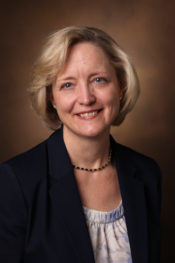A data science institute, new faculty and technical staff, and expanded educational offerings are the key investments recommended by the Data Science Visions Working Group to leverage Vanderbilt’s collaborative culture and advance foundational research and data science skills across campus.

“Data science forms a natural hub for collaboration across fields and schools, and our compact campus and One Vanderbilt culture allows discoveries to flourish,” Provost and Vice Chancellor for Academic Affairs Susan R. Wente said. “This initiative is designed to ensure our research and scholarship is competitive and innovative.”
Wente appointed the working group after receiving multiple Trans-Institutional Program proposals in 2017 and years prior that centered on data science. Trans-Institutional Programs are a key component of the Academic Strategic Plan, which are supported by a $50 million investment in faculty-led, cross-campus collaborations. She asked the working group to identify Vanderbilt’s assets and strengths in data science and develop a plan that would leverage synergies to propel the university’s research enterprise forward.
“I’m grateful to the working group’s co-chairs, Associate Professor of Physics and Astronomy Andreas Berlind and Yu Shyr, the Harold L. Moses Professor of Cancer Research and chair of the Department of Biostatistics, and all the members of the group for developing a vision that recognizes and builds upon these strengths,” she said.
Data science is a fusion of computation, mathematics and statistics that uses complex data to extract knowledge and enable discovery. Data science also includes artificial intelligence and machine learning. It is revolutionizing many academic fields and is also emerging as critical training for careers in the new information-based economy. Data science is often mentioned alongside “big data,” particularly large and complex datasets, but is more focused on the process of learning from data rather than the size of the dataset itself.
The proposed institute would advance research and teaching at Vanderbilt by equipping faculty with skills and resources; by providing resources to faculty with less robust skills; by supporting new curricular offerings through a professional master’s program, undergraduate courses and informal training; and by advancing foundational research across disciplines.
“This initiative would take advantage of groups already doing data-intensive work,” Wente said. “It would also expand the impact of several world-class and unique datasets either hosted by or heavily used by Vanderbilt researchers and will advance faculty efforts across the biomedical and natural sciences, social sciences and humanities.”
The working group conducted research on and off campus, collected information through surveys and town halls, and visited data science institutes at other universities.
The report noted several examples of both multidisciplinary collaborations and disciplinary research that would be enhanced by investments in data science, including smart cities, early diagnosis of disease and analyzing the structure of the universe or physical examples of cultural heritage.
“The power and impact of data science extends well beyond economic productivity,” the report said. “Leveraging and amplifying the expertise of faculty, research staff and students at Vanderbilt is critical to ensuring that breakthroughs in data science are created and applied to advance discovery and learning to tackle major societal problems in service to humanity.”
In consultation with the deans of the schools and colleges, the provost’s office will develop an action plan this summer in response to the report.